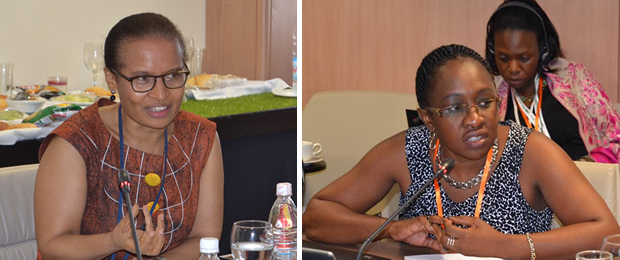Infrastructure is not neutral – AfDB Special Envoy for Gender

Abidjan, 16 November 2015 - Government representatives, senior policy-makers and experts in Abidjan on Monday shone the spotlight on the importance of mainstreaming gender into infrastructure development. Meeting on the side-lines of the first-ever week dedicated to discussing the challenges and opportunities facing Africa as it embarks on accelerating its efforts to implement regional infrastructure projects, participants heard that ongoing gender inequalities often meant that women and men often do not benefit from infrastructure investments to the same extent.
The International Monetary Fund, for instance, highlights that overcoming gender inequality and gender-related legal restrictions would increase annual GDP growth in sub-Saharan Africa by 0.75 per cent.
In her opening remarks to delegates, African Development Bank (AfDB) Special Envoy on Gender Geraldine Fraser- Moleketi said, “It is a fallacy that infrastructure development is neutral. It is vital for women to be part of the design, construction and delivery of infrastructure.”

Ms. Fraser-Moleketi (left), who chaired the meeting, challenged participants to seriously consider how infrastructure development could be more gender responsive.
In her presentation Professor Valerie Ongolo Zongo, Director of Planning, Programming and Cooperation, in Cameroon’s Ministry of Transport said that current research on the impact of infrastructure on women was often limited to counting the number of women employed in these projects. “There are many other factors that should be taken into consideration, including the impact that these initiatives may have on access to medical care and the consequences of these initiatives on small-scale traders.” She also called for a more participatory approach to infrastructure, which would contribute to more inclusive and people-centred infrastructure.
Turning to ICT infrastructure development, Professor Bitange Ndemo of the University of Nairobi Business School said that it was important for the greater inclusion of women in information technology given the potential scalability of computer applications.
In her intervention, NEPAD ICT Programme Officer Dr. Towela Jere (above right) noted that it was important to develop a set of indicators in order to assess the gender responsiveness of throughout the infrastructure project cycle. She further added that it was as important to enable women to be providers of infrastructure services. “ Women are often seen as consumers of infrastructure services, rather than drivers of these processes. We should ensure that there is capacity development to ensure that women are among the designers, the engineers and the scientists in the conceptualisation and execution of these initiatives."
Source: NEPAD Agency
